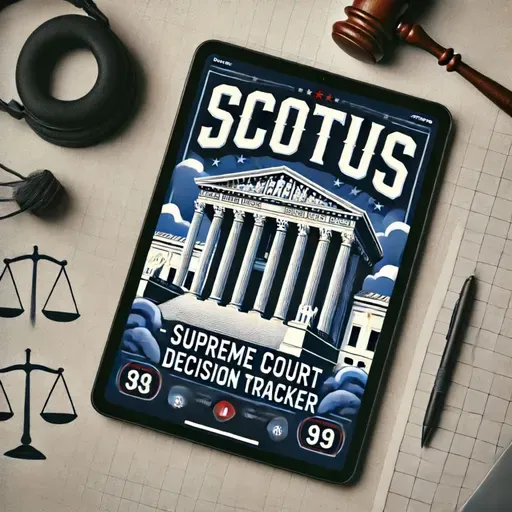
01 September 2025
Supreme Court Rulings Set to Reshape Presidential Powers and Trade Policy
Supreme Court Tracker - SCOTUS News
About
Supreme Court news is focused on several high-impact cases and rulings that could reshape the powers of the presidency and U.S. trade policy. According to The Wall Street Journal and The Washington Post, one of the biggest developments concerns ongoing legal battles over former President Trump's use of emergency powers to impose tariffs on multiple countries, including China, Mexico, and Canada. A federal appeals court recently ruled these tariffs unlawful, stating that the International Emergency Economic Powers Act, or IEEPA, does not grant the president the authority to set tariffs without explicit congressional approval. However, the ruling will not take effect until mid-October to allow time for the administration to appeal to the Supreme Court. Legal observers note that this case will test the "critical problem principle" established in 2022, which limits a president's ability to take sweeping actions without a clear delegation of authority from Congress.
At the same time, The Washington Post highlights several other cases currently before the Supreme Court that could redefine the boundaries between executive, legislative, and independent agency power. These include President Trump's attempt to remove Lisa Cook from the Federal Reserve Board of Governors, which has sparked a lawsuit likely to make its way to the high court, and challenges over the president's suspension of foreign aid and other major policy shifts. Experts suggest the totality of these cases could represent the most significant test in decades of presidential authority versus congressional power.
In another important development, Fox News reports that a federal judge recently blocked a Trump administration policy allowing expedited deportations of undocumented immigrants who have been in the country for less than two years, finding it violated due process rights. This, too, is expected to be appealed.
Additionally, the Supreme Court made headlines by allowing the National Institutes of Health to terminate grants, setting new precedent for agency litigation. This follows up on a previous Department of Education case, expanding federal authority in discretionary grant management.
All these issues are set against the backdrop of a Supreme Court with a solid conservative majority, which analysts say could influence the outcomes, especially since three current justices were nominated by Trump himself. The Supreme Court is expected to hear arguments on the administration’s appeal over the tariffs this winter or early spring, with a decision likely to come weeks or months after oral arguments.
Thanks for tuning in and make sure to subscribe. This has been a quiet please production, for more check out quiet please dot ai.
For more http://www.quietplease.ai
Get the best deals https://amzn.to/3ODvOta
At the same time, The Washington Post highlights several other cases currently before the Supreme Court that could redefine the boundaries between executive, legislative, and independent agency power. These include President Trump's attempt to remove Lisa Cook from the Federal Reserve Board of Governors, which has sparked a lawsuit likely to make its way to the high court, and challenges over the president's suspension of foreign aid and other major policy shifts. Experts suggest the totality of these cases could represent the most significant test in decades of presidential authority versus congressional power.
In another important development, Fox News reports that a federal judge recently blocked a Trump administration policy allowing expedited deportations of undocumented immigrants who have been in the country for less than two years, finding it violated due process rights. This, too, is expected to be appealed.
Additionally, the Supreme Court made headlines by allowing the National Institutes of Health to terminate grants, setting new precedent for agency litigation. This follows up on a previous Department of Education case, expanding federal authority in discretionary grant management.
All these issues are set against the backdrop of a Supreme Court with a solid conservative majority, which analysts say could influence the outcomes, especially since three current justices were nominated by Trump himself. The Supreme Court is expected to hear arguments on the administration’s appeal over the tariffs this winter or early spring, with a decision likely to come weeks or months after oral arguments.
Thanks for tuning in and make sure to subscribe. This has been a quiet please production, for more check out quiet please dot ai.
For more http://www.quietplease.ai
Get the best deals https://amzn.to/3ODvOta